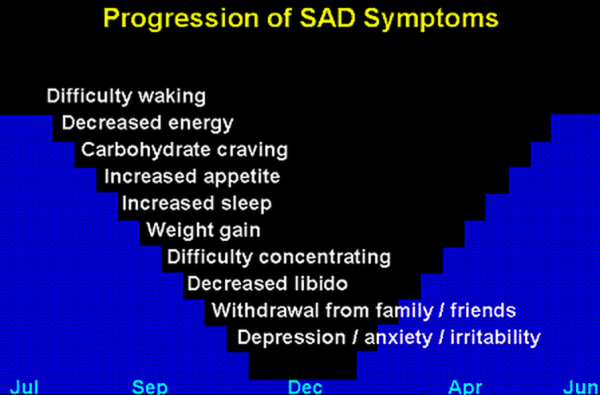Seasonal Affective Disorder | Do you have it? What to do?

 Do I have SAD? | The U.S. National Library of Medicine notes that "some people experience a serious mood change when the seasons change.
Do I have SAD? | The U.S. National Library of Medicine notes that "some people experience a serious mood change when the seasons change.
They may sleep too much, have little energy, and may also feel depressed. We have to agree, and with winter here in Minnesota, you get lots of cloud cover and bitter cold, all adding to the components that can lead to SAD.
Seasonal affective disorder also known as SAD or winter depression, the winter blues or seasonal depression. This affects millions of people, education and understanding of this pattern is important to finding out how to best treat it.
What are the signs and symptoms?
- Difficulty waking up
- Nausea
- Tendency to oversleep and overeat
- Craving for carbohydrates (leading to weight gain)
- Lack of energy to perform daily activities
- Difficulty concentrating on or completing tasks
- Withdrawal from friends, family, and social activities, and decreased sex drive
All of this leads to depression, feelings of hopelessness, and lack of pleasure, so what causes it?
As we all have experienced, the winter months reduce our activity levels, it has been argued that SAD is an evolved adaptation in humans that is a variation or remnant of a hibernation response.
Seasonal mood variation is also believed to be caused by lack of sunlight, as demonstrated by statistics of northern regions and those with high levels of cloud cover. There is evidence that patients with SAD have a delay in their circadian rhythms.
Seasonal Affective Disorder | What can I do about it?
Here are 6 practical steps to improve symptoms of SAD:
1. Let There Be Light
As we get older, we tend to spent less and less time outdoors. It gets worst around this season because of the increased cloud cover, snow, reduced daylight, and cold weather.
When the sun finally appears, take a break outside to absorb the natural rays for a dose of Vitamin D. If you can’t get out (as much as you want), maybe an additional light source can be helpful to add the appropriate Vitamin D to your world. They do work.
2. Helping yourself through Exercise
Stimulating our muscles, heart rates and getting a good sweat can get us fit but also benefit our mental states. Exercising helps to release the “feel good” chemicals in our brains that leave us in positive frames of mind. Team sports and activities are also effective for lifting our moods.
3. Eat healthy regularly
Consistently providing your body with what it needs and having a good relationship with food is important for health.
There’s nothing wrong with enjoying some comfort food as part of a balanced diet, but avoid binge-eating and excessive drinking.
4. Family and Friends
Seasonal depression can make you feel very isolated. Negative thoughts will likely pop up daily, so it’s important to keep your loved ones aware of what you’re going through.
For some, this may be a challenge, but having a support system during dark times is better than going at it alone. Who brightens up your mood? Often times, just telling your friend that this is a time of the year that brings many down and that you appreciate their friendship can boost your inner self.
5. Sleep
Since it gets dark early, it’s tempting to hit the snooze button or even jump into bed when problems occur. A bit of planning, efficient time management and a pre-bed routine will set you up for a better night of sleep.
It may require self-discipline, but aiming for seven to eight hours every night will keep your sleep patterns in check.
A short afternoon nap can re-energize you, but refrain from over-sleeping. If you wake up groggy, then it was too long of a nap, short naps work better than long ones.
6. Seek good over gloomy
Whether we like it or not, this happens every year, so don’t run from the problem. Go out and explore different winter sports and activities or even follow the sun and visit another country.
Keep your spirits high by enjoying the fun aspects of winter. Did you know being in a cold environment helps you burn more calories? Yet another reason to stay positive.



